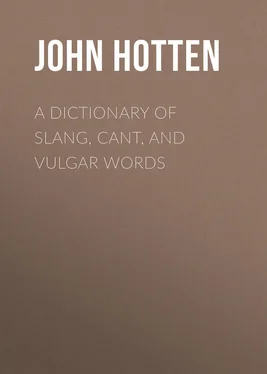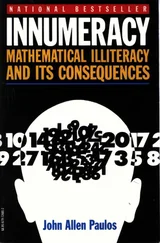John Hotten - A Dictionary of Slang, Cant, and Vulgar Words
Здесь есть возможность читать онлайн «John Hotten - A Dictionary of Slang, Cant, and Vulgar Words» — ознакомительный отрывок электронной книги совершенно бесплатно, а после прочтения отрывка купить полную версию. В некоторых случаях можно слушать аудио, скачать через торрент в формате fb2 и присутствует краткое содержание. ISBN: , Жанр: foreign_antique, foreign_prose, на английском языке. Описание произведения, (предисловие) а так же отзывы посетителей доступны на портале библиотеки ЛибКат.
- Название:A Dictionary of Slang, Cant, and Vulgar Words
- Автор:
- Жанр:
- Год:неизвестен
- ISBN:http://www.gutenberg.org/ebooks/47018
- Рейтинг книги:3 / 5. Голосов: 1
-
Избранное:Добавить в избранное
- Отзывы:
-
Ваша оценка:
- 60
- 1
- 2
- 3
- 4
- 5
A Dictionary of Slang, Cant, and Vulgar Words: краткое содержание, описание и аннотация
Предлагаем к чтению аннотацию, описание, краткое содержание или предисловие (зависит от того, что написал сам автор книги «A Dictionary of Slang, Cant, and Vulgar Words»). Если вы не нашли необходимую информацию о книге — напишите в комментариях, мы постараемся отыскать её.
A Dictionary of Slang, Cant, and Vulgar Words — читать онлайн ознакомительный отрывок
Ниже представлен текст книги, разбитый по страницам. Система сохранения места последней прочитанной страницы, позволяет с удобством читать онлайн бесплатно книгу «A Dictionary of Slang, Cant, and Vulgar Words», без необходимости каждый раз заново искать на чём Вы остановились. Поставьте закладку, и сможете в любой момент перейти на страницу, на которой закончили чтение.
Интервал:
Закладка:
Fashionable , or Upper-class Slang , is of several varieties. There is the Belgravian, military and naval, parliamentary, dandy, and the reunion and visiting Slang. Concerning the Slang of the fashionable world, a writer in Household Words curiously, but not altogether truthfully, remarks, that it is mostly imported from France; and that an unmeaning gibberish of Gallicisms runs through English fashionable conversation, and fashionable novels, and accounts of fashionable parties in the fashionable newspapers. Yet, ludicrously enough, immediately the fashionable magnates of England seize on any French idiom, the French themselves not only universally abandon it to us, but positively repudiate it altogether from their idiomatic vocabulary. If you were to tell a well-bred Frenchman that such and such an aristocratic marriage was on the tapis , he would stare with astonishment, and look down on the carpet in the startled endeavour to find a marriage in so unusual a place. If you were to talk to him of the beau monde , he would imagine you meant the world which God made, not half-a-dozen streets and squares between Hyde Park Corner and Chelsea Bun House. The thé dansante 45would be completely inexplicable to him. If you were to point out to him the Dowager Lady Grimguffin acting as chaperon to Lady Amanda Creamville, he would imagine you were referring to the petit Chaperon rouge – to little Red Riding Hood. He might just understand what was meant by vis-a-vis , entremets , and some others of the flying horde of frivolous little foreign slangisms hovering about fashionable cookery and fashionable furniture; but three-fourths of them would seem to him as barbarous French provincialisms, or, at best, but as antiquated and obsolete expressions, picked out of the letters of Mademoiselle Scuderi, or the tales of Crebillon the “younger.” Servants, too, appropriate the scraps of French conversation which fall from their masters’ guests at the dinner table, and forthwith in the world of flunkeydom the word “know” is disused, and the lady’s maid, in doubt on a particular point, asks John whether or no he SAVEYS it? 46What, too, can be more abominable than that heartless piece of fashionable newspaper Slang, regularly employed when speaking of the successful courtship of young people in the fashionable world: —
Marriage in high life. – We understand that a marriage is ARRANGED (!) betwixt the Lady, &c. &c., and the Honourable, &c. &c.
Arranged! Is that cold-blooded Smithfield or Mark-lane term for a sale or a purchase the proper word to express the hopeful, joyous, golden union of young and trustful hearts? Which is the proper way to pronounce the names of great people, and what the correct authority? Lord Cowper, we are often assured, is Lord Cooper – on this principle Lord Cowley would certainly be Lord Cooley – and Mr. Carew, we are told, should be Mr. Carey , Ponsonby should be Punsunby , Eyre should he Aire , Cholmondeley should be Chumley , St. John Singen , Majoribanks Marshbanks , Derby Darby (its ancient pronunciation), and Powell should always be Poel . I don’t know that these lofty persons have as much cause to complain of the illiberality of fate in giving them disagreeable names as did the celebrated Psyche (as she was termed by Tom Moore), whose original name, through her husband, was Teague , but which was afterwards altered to Tighe.
Parliamentary Slang , excepting a few peculiar terms connected with “ the House” (scarcely Slang, I suppose), is mainly composed of fashionable, literary, and learned Slang. When members, however, get excited and wish to be forcible, they are often not very particular which of the street terms they select, providing it carries, as good old Dr. South said, plenty of wild-fire in it. Sir Hugh Cairns very lately spoke of “that homely but expressive phrase, DODGE.” Out of “the House,” several Slang terms are used in connection with Parliament or members of Parliament. If Lord Palmerston is known by name to the tribes of the Caucasus and Asia Minor as a great foreign diplomatist, when the name of our Queen Victoria is an unknown title to the inhabitants of those parts – as was stated in the Times a short time ago, – I have only to remark that amongst the costers and the wild inhabitants of the streets he is better known as PAM. I have often heard the cabmen on the “ranks” in Piccadilly remark of the late Chancellor of the Exchequer, when he has been going from his residence at Grosvenor Gate, to Derby House in St. James’s Square, – “hollo, there! de yer see old DIZZY doing a stump?” A PLUMPER is a single vote at an election, – not a SPLIT-TICKET; and electors who have occupied a house, no matter how small, and boiled a pot in it, thus qualifying themselves for voting, are termed POT-WOLLOPERS. A quiet WALK OVER is a re-election without opposition and much cost. A CAUCUS meeting refers to the private assembling of politicians before an election, when candidates are chosen and measures of action agreed upon. The term comes from America. A JOB, in political phraseology, is a government office or contract obtained by secret influence or favouritism. Only the other day the Times spoke of “the patriotic member of Parliament POTTED OUT in a dusty little lodging somewhere about Bury-street.” The term QUOCKERWODGER, although referring to a wooden toy figure which jerks its limbs about when pulled by a string, has been supplemented with a political meaning. A pseudo-politician, one whose strings of action are pulled by somebody else, is now often termed a QUOCKERWODGER. The term RAT, too, in allusion to rats deserting vessels about to sink, has long been employed towards those turncoat politicians who change their party for interest. Who that occasionally passes near the Houses of Parliament has not often noticed stout or careful M.P.s walk briskly through the Hall and on the curb-stone in front, with umbrella or walking cane uplifted, shout to the cabmen on the rank, FOUR-WHEELER! The term is a useful one, but I am afraid we must consider it Slang, until it is stamped with the mint mark of lexicographical authority. 47
Military , or Officers’ Slang is on a par, and of a character with Dandy Slang . Inconvenient friends, or elderly and lecturing relatives, are pronounced DREADFUL BORES. Four-wheel cabs are called BOUNDERS; and a member of the Four-in-hand Club, driving to Epsom on the Derby day, would, using fashionable slang phraseology, speak of it as TOOLING HIS DRAG DOWN TO THE DERBY. A vehicle, if not a DRAG (or dwag) is a TRAP, or a CASK; and if the TURN OUT happens to be in other than a trim condition, it is pronounced at once as not DOWN THE ROAD. Your city swell would say it is not UP TO THE MARK; whilst the costermonger would call it WERY DICKEY. In the army a barrack or military station is known as a LOBSTER-BOX; to “cram” for an examination is to MUG-UP; to reject from the examination is to SPIN; and that part of the barrack occupied by subalterns is frequently spoken of as the ROOKERY. In dandy or swell Slang, any celebrity, from Robson of the Olympic, to the Pope of Rome, is a SWELL. Wrinkled faced old professors, who hold dress and fashionable tailors in abhorrence, are called AWFUL SWELLS, – if they happen to be very learned or clever. I may remark that in this upper class Slang a title is termed a HANDLE; trousers, INEXPRESSIBLES; or when of a large pattern, or the inflated Zouave cut, HOWLING BAGS; a superior appearance, EXTENSIVE; a four-wheeled cab, a BIRDCAGE; a dance, a HOP; dining at another man’s table, “sitting under his MAHOGANY;” anything flashy or showy, LOUD; the peculiar make or cut of a coat, its BUILD; full dress, FULL-FIG; wearing clothes which represent the very extreme of fashion, “dressing to DEATH;” a reunion, a SPREAD; a friend (or a “good fellow”), a TRUMP; a difficulty, a SCREW LOOSE; and everything that is unpleasant, “from bad sherry to a writ from a tailor,” JEUCED INFERNAL. The military phrase, “to send a man to COVENTRY,” or permit no person to speak to him, although an ancient saying, must still be considered Slang.
Читать дальшеИнтервал:
Закладка:
Похожие книги на «A Dictionary of Slang, Cant, and Vulgar Words»
Представляем Вашему вниманию похожие книги на «A Dictionary of Slang, Cant, and Vulgar Words» списком для выбора. Мы отобрали схожую по названию и смыслу литературу в надежде предоставить читателям больше вариантов отыскать новые, интересные, ещё непрочитанные произведения.
Обсуждение, отзывы о книге «A Dictionary of Slang, Cant, and Vulgar Words» и просто собственные мнения читателей. Оставьте ваши комментарии, напишите, что Вы думаете о произведении, его смысле или главных героях. Укажите что конкретно понравилось, а что нет, и почему Вы так считаете.












